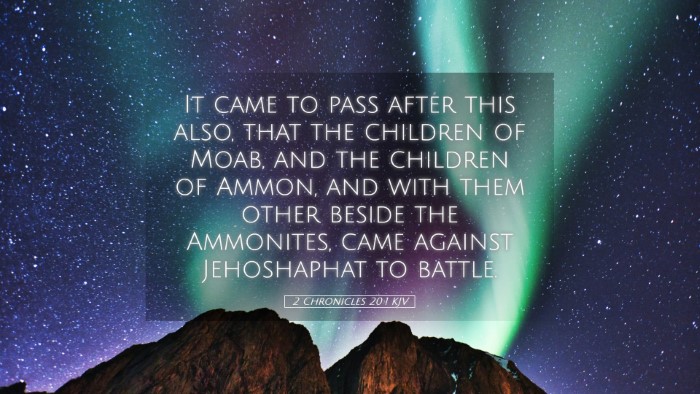Commentary on 2 Chronicles 20:1
Verse Text: "After this, the Moabites and Ammonites, with some of the Meunites, came to wage war against Jehoshaphat."
Introduction
This pivotal verse in 2 Chronicles introduces a significant moment in the reign of King Jehoshaphat of Judah. It sets the stage for a narrative of conflict, reliance on God, and divine intervention. In exploring the implications of this verse, we draw from prominent public domain commentaries to offer rich insights for pastors, students, theologians, and scholars.
Contextual Setting
The historical context of this verse is essential for understanding the narrative that follows. Jehoshaphat, known for his efforts to restore the worship of Yahweh and his judicial reforms, faces the imminent threat of invasion from a coalition of enemies.
- Threats from Surrounding Nations: The Moabites and Ammonites were perennial adversaries of Israel, often capitalizing on Israel's internal strife.
- The Role of the Meunites: Though less known, the Meunites add a significant dimension as allies in this confrontation, reflecting the geopolitical landscape of the time.
Theological Implications
This verse illustrates the tension between faith and fear that characterizes human experience, particularly in leadership. Jehoshaphat's response to the crisis is crucial, suggesting themes of divine sovereignty and human agency.
Lessons on Leadership
Matthew Henry emphasizes the trials that test a leader's faith. Jehoshaphat’s challenge is not just military; it is spiritual, calling for strong leadership rooted in trust in God. In times of distress, leaders are often faced with the temptation to rely on their understanding rather than seeking divine guidance.
The Power of Unity Against Adversity
Albert Barnes points out that the gathering of these nations indicates a unified front against God’s people. This serves as a reminder of the collective forces that may rise up against those who stand for righteousness, foreshadowing the need for a collective spiritual response.
Divine Dependence in Crisis
Adam Clarke reiterates that the appearance of calamity often disrupts the status quo, prompting a call to prayer and seeking God's aid. This principle reaffirms the belief that one must turn to God in times of trouble, setting the stage for what follows in Jehoshaphat's story.
The Nature of the Conflict
The coalition against Judah represents more than a physical battle; it symbolizes the spiritual battles faced by believers. This conflict invites deeper exploration of the spiritual warfare that accompanies faithfulness to God amidst opposition.
The Importance of Preparation
Commentators highlight that this crisis provides an opportunity for preparation. Jehoshaphat’s subsequent actions demonstrate a leader who seeks to prepare his people not merely for battle but for seeking God’s favor. The necessity of prayer and collective repentance are themes emphasized throughout the narrative.
God's Sovereignty Over Nations
The presence of this coalition also serves to illustrate God's sovereignty over the nations. While the odds appear daunting, the following passages reveal God addressing the threat, suggesting that divine intervention is possible despite overwhelming circumstances.
Application for Today
The lessons derived from 2 Chronicles 20:1 extend far beyond the historical context. Modern believers and leaders can take solace in the understanding that God is aware of all threats faced by His people and that faith and communal prayer are vital resources in the face of adversity.
- Encouragement for Believers: In times of distress, turning to God with humility and seeking His guidance can lead to miraculous outcomes.
- The Role of Community: Just as Jehoshaphat rallied his people, believers today are called to unite in prayer and action, strengthening one another in the face of spiritual battles.
Conclusion
2 Chronicles 20:1 invites readers into a narrative rich with lessons on faith, leadership, and divine intervention. In studying this passage, we are reminded that while opposition may arise, the faithful can stand firm, relying on God’s promises and providence. As we reflect on this verse, may it inspire deeper trust in God’s ability to deliver His people from any threat.


